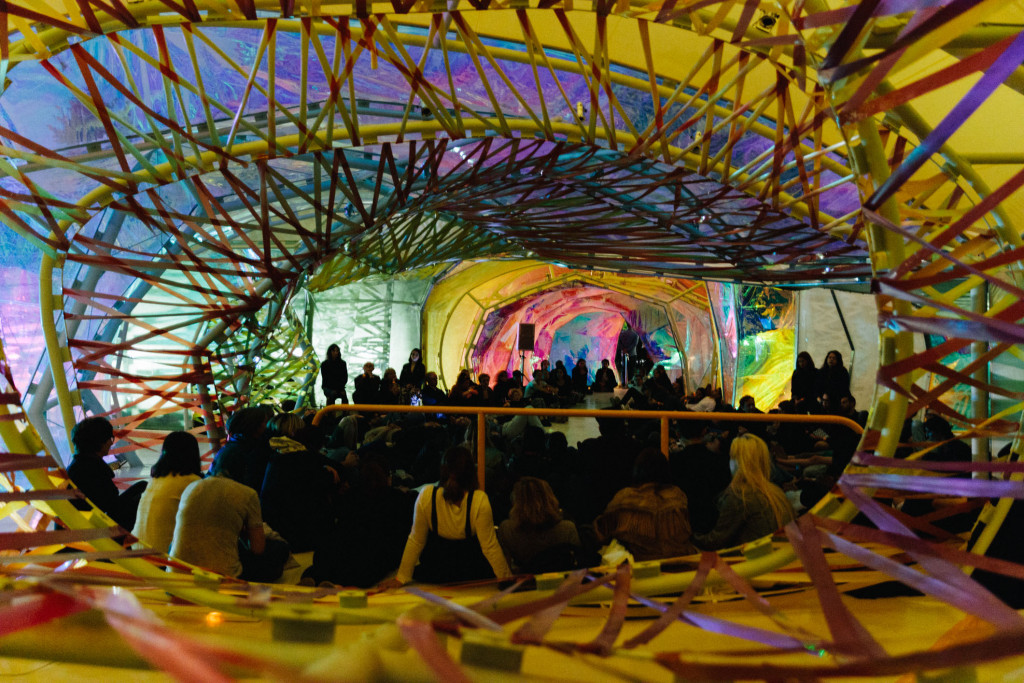NTGNE is a retelling of, Antigone, the hellenic fable whose eponymous heroine has been an enduring symbol of anti-imperial struggle for centuries. Like Sophocles’ original work which was written at a time of great national fervor, Jesse Darling’s performance is presented in London on the anniversary of the 9/11 attacks, a day of mass mourning and a sobre reminder of the greatest ideological attack on the Western Imperial project in modern times.
After jostling for space in the crowded Serpentine Pavilion, I find myself lying flat on a yoga mat in complete darkness, contorted amongst the multitude of bodies that have piled inside. As the performance begins, a discordant throb of electrical interference pulses through the air, vibrating the opalescent skin of the stage set. The atmosphere is ominous and psychedelic, like a bad trip, and my discomfort is intensified by a foreboding meta-commentary between bursts of white noise; “…the floor feels really hard on your head”, I am told by a young voice as I fidget, “you feel vulnerable…you’re forced to”. I am now hyper aware of my body and its encroachment into shared space. As audience members settle around each other, a chorus erupts, holding a dissonant harmony until their voices waver, breath running out, reminding us of our corporeality and the frailty of a collective voice.

A News jingle chimes over the PA; a reporter from ISMN (“International, State and Municipal Newswire” – whose initials are extrapolated from the name of Ismene, Antigone’s sister) who we are told is our “only legitimate truth source”, warns us of an epidemic with an unknown source that is sending the city’s residents into “mass hysteria”. The virus, NTGNE (an acronym for National Terror Grief Negation Epidemic), threatens to engulf the entirety of the “pale kingdom” of King Carry-On (whose name is a pun the original King Creon in Sophocles’ version, among other things). The allusions to 9/11 and the fall of Empire are recurrent, and the staging of the performance on a day of commemoration gives a sinister tone to the unfolding news reports that pace the production. The cast –with writer Penny Goring, actor Shia Labeouf and Darling’s own dad among them –burst into life, writhing and crawling, zombie-like, through the unsuspecting crowd having previously hidden in plain sight. An orgiastic struggle ensues and members of the audience are dragged to their fate as the performance reaches its climax. A silence descends, the crowd is left in a state of panic. Abruptly, we are told to “Leave the auditorium immediately”, to which we duly oblige, fleeing the scene of the imaginary contagion with considerable urgency.

Darling’s NTGNE is a somber reflection on powerlessness and subjugation, a complex deconstruction of neo-liberal subjectivity and Empire. Indeed, the etymology of the name ‘Antigone’, meaning “worthy of one’s parents”, elucidates a complex narrative of hierarchy and inheritance, and it is the legacy of these inherited ideologies that Darling is most interested, not least through the involvement of their own family as cast members. NTGNE tells us that to mourn the conditions of late capitalism is to mourn our collective agency, but that to deviate is to die. Upon taking our leave, we are given passenger jet-shaped cookies, fuselage aflame and wrapped carefully in cellophane; a saccharine end to a bitter morality tale. **













